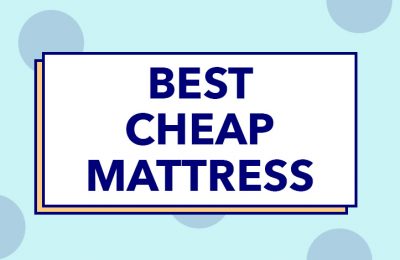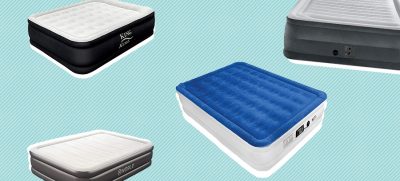Many sleepers out there use futons, whether as their primary bed, a way to conserve space, or something extra for the guest room. But finding the best futon mattress is no easy task, as it’s a very specific type of mattress. Fortunately, we’ve gone ahead and rounded up the best futon mattresses for your reading pleasure.
Before we begin, it’s important to note that when we say the word “futon,” we’re mostly talking about Western-style futons, which often have slatted frames and can switch back and forth between being a bed and a sofa. That being said, we did include one traditional Japanese floor futon.
But enough with the introductions. Read on to decide which of these futons is the best fit for you!
Our Top Pick for Futon Mattresses
The Mozaic Trupedic earned our top spot in this list because of its quality construction, as well as offering a variety of color options.
Best Futon Mattresses – 2024
- Best Overall Futon Mattress – Mozaic Trupedic
- Most Comfortable Futon Mattress – Kodiak
- Best Queen Futon Mattress – D&D Rolling Futon Mattress
- Best Memory Foam Futon Mattress – Milliard Memory Foam Futon Mattress
- Best Futon Sofa Bed – ILULULU Futon Sofa Bed
Best Overall – Mozaic Trupedic
Mozaic Trupedic Futon Mattress
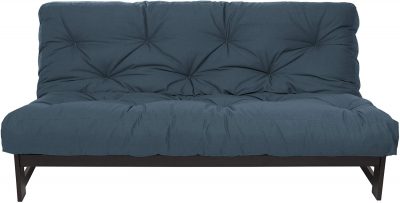
Made with CertiPUR-US certified foam, this futon mattress uses foams that are certified to be safe and have fewer emissions than other foams, and comes in a variety of colors.
Expert Opinion
Because futons have to be flexible and fit into the unique design of a futon frame, they usually don’t have all of the luxurious features found in some regular mattresses. But the Mozaic Trupedic manages to go the extra mile with its construction of CertiPUR-US certified foam. Wrapped in cotton, the material is breathable and more environmentally friendly than standard types of foam. It should help you sleep cool while also offering a nice balance of comfort and support.
What customers say: Amazon reviewers noted how easy the futon is to set up, as well as it being a comfortable option for a guest room.
Pros of the Mozaic Trupedic
- You can choose from a variety of visually soothing colors for the Mozaic Trupedic, including Dusty Blue, Camel Khaki, Dusk Blue, and Space Navy Blue.
- Cotton is a very breathable fabric, which should help prevent hot air from being trapped in this futon mattress. In other words, this futon is going to be a solid option for hot sleepers.
- his futon mattress comes in at a pretty affordable price, making it a solid option for those on a budget.
Cons of the Mozaic Trupedic
- The cover of the Mozaic Trupedic is not machine washable. For care, you can spot-clean the cover with cold water and detergent.
Click here to get the best deal or check out more of our best mattresses.
Most Comfortable Mattress – Kodiak
Kodiak Furniture Futon Mattress
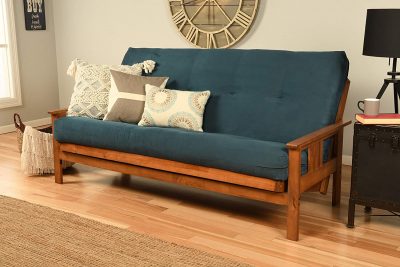
This futon mattress stands out for its hybrid construction of both foam and coils. This gives it a great balance of comfort and support that side sleepers should love.
Expert Opinion
Let’s face it: futons are affordable, but they’re just not the same as the mattresses you’ve likely slept on throughout your life. We think the construction of the Kodiak should mimic the feel of a regular mattress better than others on the market. Both the coils (13-gauge Bonnell, to be exact) and the foams conform to your body to offer pressure relief at the shoulders and hips. And these coils should ensure proper support, especially for folks who are accustomed to sleeping on a standard mattress. The foams included in this should provide some comfy pressure relief.
What customers say: One Amazon reviewer said they had “slept on it a few times and would not think twice about having a guest use it” because it was so comfortable.
Pros of the Kodiak Futon Mattress
- The inclusion of coils adds to the overall durability of the Kodiak Futon.
- This futon mattress is available in four different colors: chocolate, navy, gray, and peat.
- The foam in this futon is CertiPUR-US certified for materials and emissions.
Cons of the Kodiak Futon Mattress
- Several customers noted in reviews that the futon is difficult to fold.
Click here to get the best deal or check out more of our most comfortable mattresses.
Best Queen Mattress – D&D Rolling Futon Mattress
D&D Rolling Futon Mattress
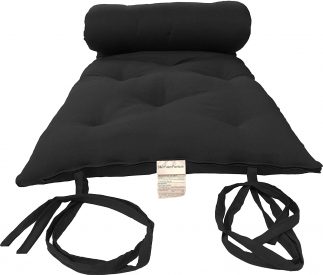
A throwback to the traditional Japanese futons of old, the D&D Rolling Futon Mattress can be spread out on the ground without a bed frame.
Expert Opinion
The D&D Rolling Futon Mattress is a traditional Japanese floor futon, which means that it doesn’t need any kind of frame. Simply unroll it on the ground and get to resting on its resilient foam, covered on all sides by cotton and fiber batting. But just because it’s portable doesn’t mean that it’s not spacious. This mattress measures three inches by 60 inches by 80 inches. This is the same size as a queen bed. You’ll have plenty of room to spread out without even having to assemble a futon frame.
Fun fact: the traditional Japanese floor futon is actually the original type of futon, dating back all the way to the 1800s. The more contemporary Western-style futons that most of us in the U.S. know today didn’t pop up until the late 20th century.
What customers say: Reviewers on Amazon note how easy this futon mattress is to roll up and store when not in use.
Pros of the D&D Rolling Futon Mattress
- If you’re looking for a floor futon, like the traditional Japanese-style ones, this D&D Rolling futon mattress is a good option.
- If you prefer to buy products made in the United States, the D&D Rolling futon mattress will work for you.
- Because this futon mattress can be rolled up and doesn’t require a frame, you can easily store it in a closet or cabinet when not in use.
Cons of the D&D Rolling Futon Mattress
- If you’re looking for a futon mattress for a frame, this won’t likely won’t be compatible. This isn’t a Western-style futon, as it is designed for use on the floor.
Click here to get the best deal or check out more of our best queen mattresses.
Best Memory Foam Mattress – Milliard Memory Foam Futon Mattress
Milliard Memory Foam Futon Mattress
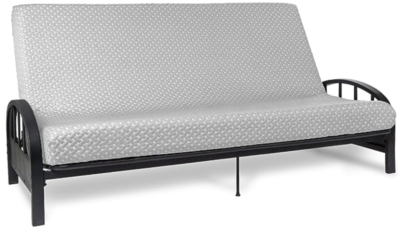
The Milliard Memory Foam Futon Mattress utilizes a bamboo cover and multiple memory foam layers to provide a cooler, more durable, and more comfortable sleep.
Sleepopolis Score
4.70 / 5





Expert Opinion
Some aren’t particular on the materials that go into a mattress so long as it’s comfy, but others have their minds set on the traditional, slow-sinking feel of memory foam. If you’re wanting a futon that should provide lots of comfortable contouring, check out the Milliard Memory Foam Futon Mattress. It actually consists of two different layers of memory foam. One is a two-inch block of pressure-relieving memory foam, and the other is a four-inch block of high-density support foam. This is all topped by a fireproof barrier and a bamboo cover.
What customers say: Amazon shoppers comment on the high quality of this futon mattress for such a value price. So, this could be a great option for budget shoppers.
Pros of the Milliard Memory Foam Futon Mattress
- You can use a sofa frame to make this futon into a couch. Alternatively, you can use a bed frame to make it into a sleeping space.
- This mattress comes in three different colors, just in case you are wanting a fun sofa option: light grey, black, and ivory.
- You won’t have to worry about spills or messes, since the bamboo cover is machine-washable.
Cons of the Milliard Memory Foam Futon Mattress
- Unfortunately, this futon mattress does not come with a frame, but Milliard does sell a futon frame separately on Amazon.
Click here to get the best deal or check out more of the best memory foam mattresses.
Best Sofa Bed – IULULU Futon Sofa Bed
IULULU Futon Sofa Bed
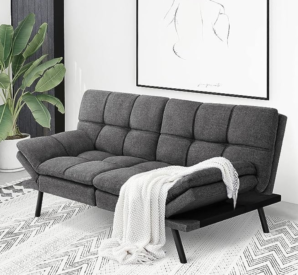
The IULULU takes budget comfort to the next level in the form of a futon sofa bed, which serves smaller spaces and a variety of purposes.
Sleepopolis Score
4.20 / 5





Expert Opinion
The IULULU Futon Sofa Bed is for anyone wanting a multipurpose futon that serves as– you guessed it –a sofa and a bed. It’s certainly more than meets the eye, because you can set it in two other positions: split-back and lounge. The arms of the sofa are adjustable in three different positions, so you can really choose your own comfort here. Shredded memory foam makes up the fill of this mattress beneath the cover, while its spring system serves as support.
What customers say: Customers praise the easy set-up, versatility, and overall convenience of the IULULU Futon Sofa Bed.
Pros of the IULULU Futon Sofa Bed
- This futon sofa bed is offered in three different colors: grey, black, and brown. The black and brown have a sophisticated, leathery look to them, while the grey has a polyester cover.
- Manufacturer information reveals this sofa bed should hold up to 600 pounds.
- IULULU created this product for smaller spaces, so it’s great for tiny apartments or even guest rooms.
Cons of the IULULU Futon Sofa Bed
- This futon sofa bed best suits folks under 5’6″. So, if you’re a tall sleeper, or if you’re expecting tall guests, you might want to look elsewhere.
Click here to get the best deal.
Who Should Buy a Futon Mattress
Budget Shoppers
Regular mattresses can cost upwards of $1,000 if you’re looking for a truly great bed that’s going to last. For many people, this price isn’t ideal for their budget. Futon mattresses — essentially an alternate version of the sofa bed — are often in the $150–$300 range and make an excellent and affordable alternative to other mattresses. Feel free to browse our roundup for the best cheap mattresses.
Those with a Smaller Space
Futons are fantastic for small apartments, college dorms, and just about any room requiring versatile and space-saving furniture. They’re also multifunctional, so rather than having one giant couch and one giant mattress taking up all of the room in your apartment, why not have both in one?
The best twin mattresses are also fantastic space-saving options.
Those Looking for a Great Guest Bed
There are a number of great futon mattress models that are incredibly comfortable and supportive, which are perfect for hosting. If you don’t have the space for a guest room, futons can make things feel a bit more like home for your visitors.
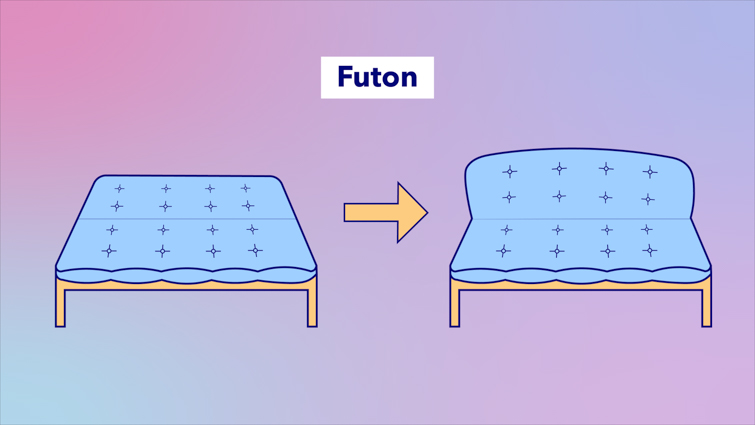
Who Shouldn’t Buy a Futon Mattress
Those Who Want a Bouncy Feel
The price difference between a futon and a regular mattress exists for a reason; unfortunately, you may not get all of the features and qualities you’re looking for, or at least to the degree you’d like. Those searching for a responsive mattress and a bouncy feel should know that futons likely won’t be able to deliver the same quality. However, if you want to come close, we suggest you purchase a futon mattress including springs.
Those Who Want Extreme Durability
Again, with a price this good, futons likely aren’t going to last as long as a regular mattress. However, if you purchase a quality futon with good materials (especially a futon with springs), it could last you as long as some normal mattresses. To make sure your futon has a lengthy lifespan, we recommend taking time to care for your futon. This can mean airing it out once in a while, cleaning it properly, and flipping it over if advised. To see some of the most durable options, check out our roundup for the best mattresses that won’t sag.
How to Care for Your Futon
Above all else, we highly recommend you follow the manufacturer’s instructions. Each mattress has a different construction, and therefore an ideal cleaning process. When in doubt, however, these are some tips that could be good to follow:
- Vacuum: After taking off any sheets or pillows, we recommend tackling larger dirt particles first with a vacuum cleaner. Using the hose attachment on the vacuum can make it easier to get into hard-to-reach areas.
- Remove odors and stains: Sprinkling baking soda over the futon mattress, letting it sit, and then vacuuming once more can help with any smells. Spot-cleaning by dabbing mild laundry detergent over the stain and washing it with a little bit of warm water can help remove stains.
- Wash: You can steam clean the mattress in many cases, and this is a great eco-friendly method for disinfection.
- Dry: It’s best to let a mattress air-dry, but if you want to speed up the process, you can use a fan or two to assist. Mattress covers, on the other hand, are often machine-washable. Again, it does depend on how delicate the material is.
General Mattress Guidelines
Firmness
The industry scale for firmness is between 1 (super soft) and 10 (super firm), with a medium-firm mattress falling at a 6.5 out of 10. Depending on your personal preferences, your body type, and your sleeping position, there’s an ideal firmness for you somewhere in this range. See our mattress firmness guide for details.
Sleep Position
Back sleeping, side sleeping, and stomach sleeping are the three most common sleep positions. Combination sleeping is popular as well, which involves a person switching positions throughout the night.
The general rule is that side sleepers need a softer mattress, stomach sleepers need a firmer one, and back sleepers need something in between. Combination sleepers prefer a mattress with a bit of bounce for mobility. Folks wanting additional information can take a look at our sleeping position guide.
Body Type
Your body type is so important to keep in mind when making a mattress purchase. For instance, a great mattress for a lightweight sleeper won’t be a great mattress for a heavier sleeper. Lightweight sleepers are going to need a softer surface so they’re able to get enough contouring, whereas heavier sleepers will need a firmer mattress for additional support. Even a lightweight side sleeper might need a different mattress than a lightweight stomach sleeper. To learn more, see our guide on how to choose a mattress.
Am I A Lightweight, Average-Weight, or Heavyweight Sleeper?
Here at Sleepopolis, we use three weight categories to help folks find the mattress that will best fit them: lightweight (less than 130 pounds), average-weight (130–250 pounds), and heavyweight (more than 250 pounds). These categories are based on the average-weight category being the group most mattresses are designed for. People who are heavier or lighter than that “average” group will likely experience the mattress differently.
Heavy folks in particular tend to need a much more supportive mattress, to ensure they are receiving proper support. We recommend taking a look at our roundup of the best mattresses for heavy people, many of which are specifically designed for this group.
Materials
Each mattress model has its own special construction. Some use a lot of foam, others use a lot of springs, and so on. There is no best material when it comes down to it, because again, it’s all about your individual needs and preferences. Here are some of the most common materials used in mattresses:
- Foam: With new technology and variations such as poly foam, gel-infused foam, and memory foam, there’s a foam for everyone out there. Most mattresses have at least some foam included, but all-foam mattresses utilize both cushy comfort foams and high-density support foams. We recommend memory foam mattresses for those looking for great pressure relief, but you should look elsewhere for a super bouncy and durable mattress.
- Innerspring: These mattresses are what you’ll likely think of as traditional mattresses. The construction consists primarily of strong coils and a thin layer of foam for added comfort. As a result, this is a highly supportive, durable, and responsive mattress.
- Hybrid: If you like what you hear about the foam mattress and the innerspring, then we highly recommend checking out a hybrid mattress. This takes some of the best qualities from each construction and creates a balanced feel. It’s truly the best of both worlds.
- Latex: Looking for an all-natural, long-lasting mattress? Latex constructions are likely going to be the best fit. Not only that, these mattresses boast some incredible cooling features, making them fantastic for hot sleepers.
Shopping Online
Online shopping offers a seemingly endless amount of mattress options to choose from, and this can be incredible… or incredibly overwhelming. To help you on your mattress journey, we recommend taking our mattress quiz to determine your individual needs. Then, you can start utilizing our mattress reviews as well as our mattress roundups to narrow down your choices. And when you’re finally ready to make that purchase, head on over to our coupons page, where you’ll find many exclusive deals and discounts from your favorite brands. For more options, see our best online mattresses.
FAQs
What size is a futon mattress?
Futon mattresses are typically the same size as regular mattresses: 60 inches by 80 inches for a queen, 76 inches by 80 inches for a king, and so on. The uniqueness of a futon mattress comes more from its construction, which allows the bed to easily fold in the middle and adapt to a convertible wooden or metal frame.
How thick should a futon mattress be?
The ideal thickness for a futon mattress is between six inches and eight inches. If you’re someone who prefers a cushier mattress with more material (and in some cases, more pressure relief), you’ll want to opt for eight inches.
Do futon mattresses have springs?
Most of them don’t, as it’s harder to collapse and open up a mattress that contains springs. However, some futon mattresses — such as the Kodiak — have incorporated flexible coils into the construction in order to give the bed more comfort and support. As relaxing as this type of futon can be, know that it’s likely going to cost more than a traditional futon mattress without springs.
How long does a futon mattress usually last?
A good futon mattress should last between five and seven years, but maybe longer if it’s in a guest room and isn’t used all that often. And just like regular mattresses, beds with coils in their construction will probably last longer than those made entirely of foam.
Can you use a regular mattress on a futon frame?
No. The mattress needs to be able to fold up without compromising its structure, and standard mattresses aren’t equipped to do that. However, a futon mattress can work on a normal bed frame, just not the other way around.
How We Chose These Mattresses
Our team of Certified Sleep Science Coaches has reviewed more than 220 products in our mattress lab, running each one through tests such as pressure-mapping and measuring motion transfer with a seismometer. From there, we give every bed an overall score based on materials, comfort, support, cooling, and edge support. We also factor in brand performance with categories such as value and warranty.
We chose these futon mattresses based on their materials, functionality, and customer reviews. Click here to learn more about our methodology.
Best Futon Mattresses 2024
| Mattress | Best For | Price |
| Mozaic Trupedic | Best Overall | $169.15 |
| Kodiak | Most Comfortable | $244 |
| D&D Rolling Futon Mattress | Queen Size | $165 |
| Milliard Memory Foam Futon Mattress | Memory Foam | $199.99 |
| ILULULU Futon Sofa Bed | Sofa Bed | $299.99 |

Dan Caffrey
Editor
About Author
Dan is a Performance Editor and Certified Sleep Coach at Sleepopolis, where he writes and edits mattress roundups to give readers the most up-to-date information on sleep products. In 2020, Dan earned his MFA In Playwriting from UT Austin, and his plays have been seen around the country in Chicago, Austin, Washington D.C., and elsewhere. He’s also a pop-culture fanatic, having written for publications such as The A.V. Club, Consequence, Pitchfork, and Vox. He co-hosts two popular horror podcasts on the Bloody Disgusting Podcast Network — The Losers’ Club: A Stephen King Podcast and Halloweenies: A Horror Franchise Podcast. When he’s not catching up on the latest King novel, you can find Dan in and around Brooklyn walking his dog Hank, seeing a play with his wife, and going to way too many concerts.
Back Sleeper

